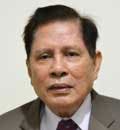First word
THE Palace and the Supreme Court had better take note, if they are still oblivious to what is happening in Congress.
Already have an active account? Log in here.
Continue reading with one of these options:
Continue reading with one of these options:
Premium + Digital Edition
Ad-free access
P 80 per month
(billed annually at P 960)
- Unlimited ad-free access to website articles
- Limited offer: Subscribe today and get digital edition access for free (accessible with up to 3 devices)
TRY FREE FOR 14 DAYS
See details
See details
If you have an active account, log in
here
.


